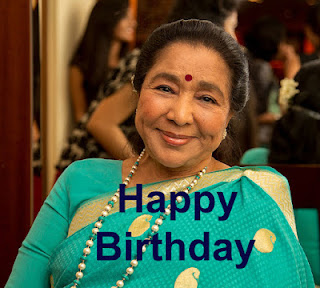Asha Bhosle (Born on 8th Sep 1933) made her Hindi film debut when she sang the song "Saawan Aaya" for Hansraj Behl's Chunariya (1948) but before that she sang her first film song '"Chala Chala Nav Bala" for the Marathi film Majha Bal (1943). She had sung over 12,000 songs, she was officially acknowledged by the Guinness Book of World Records as the most recorded artist in music history
Initially, she sang songs in low-budget B- or C-grade films. She used to get the assignments only when reputed female singers of that time like Geeta Dutt, Shamshad Begum, and Lata Mangeshkar refuse singing for the bad girls and vamps, or songs. The first time she sang in a big banner film was in Bimal Roy's Parinnta 1953 The song of that film "Gore gore haathon me mehndi racha ke"..but none of the songs was picturised on the heroine of the film Meena Kumari.
Another big banner film was RK Films Boot Polish in 1954, Raj Kapoor signed her to sing "Nanhe Munne Bachche" with Mohammed Rafi.It was O. P. Nayyar who gave Asha a break in CID (1956). For the first time, she sang for a heroine in Big banner.The song O Leke Pehla Pehla Pyar is basically sung by Mohammad Rafi and Shamshad Begum but in the second version, Asha sang for Shakeela the heroine of the film. After that O P Nayyar took her in B. R. Chopra's Naya Daur (1957), Her duets with Rafi like "Maang Ke Saath Tumhara", "Saathi Haath Badhana" and "Uden Jab Jab Zulfein Teri", penned by Sahir Ludhianvi, earned her recognition. It was the first time she sang all the songs for a film's leading actress. In 1957 another hit film released Tumsa Nahin Dekha and the song Dekho Kasam Se Kahate Hain Tum Se became another hit that year.
Sachin Dev Burman and his favourite singer, Lata Mangeshkar, were not on good terms from 1957 to 1962.During this period, S D Burman used Asha as his lead female voice.She and Burman gave many hit songs in movies such as Kaala Pani, Kaala Bazaar, Insaan Jaag Utha, Lajwanti, Sujata and Teen Deviyaan (1965).In 1958 Kaala Pani she gave voice to Madhubala once again recall the duet song "Achcha Ji Main Haari Chalo Maan Jaao" The song "Ab Ke Baras" in Bimal Roy's Bandini (1963) consolidated her position as a lead singer.
With O P Nayyar she gave hit songs in Ek Musafir Ek Hasina (1962) and Kashmir Ki Kali (1964). Recall the songs "Main Pyaar Ka Rahi Hoon" (Ek Musafir Ek Haseena), "Deewana Hua Baadal" and "Ishaaron Ishaaron Mein" (Kashmir Ki Kali). Mere Sanam, another great hit of 1965, has several beautiful songs sung by Asha and composed by Nayyar. Jaayiye aap and Yeh hai reshmi zulfon ka andhera. Both solos present two distinct emotions. Asha does full justice to both. The former is a haunting love number while the latter is a seductive one.
In 1966, she collabarated with R D Burman for Teesri Manzil. From this film started a creative and romantic partnership that revolutionised Hindi Film Music.
After Teesri Manzil both sang together a song in 1970 film The Train, Meri Jaan Maine Kaha which became hit.Asha Bhosle and R D Burman created nostalgia from Dum Maro Dum from Hare Rama Hare Krishna.The same year released Caravan,it's song Piya Tu Ab To Aaja became a cult song of this Jodi.In the 1970s, Asha and Pancham's youthful Western songs took Bollywood music by storm.The 1975 hit Khel Khel Mein is yet another R D Burman favourite. It had fun-filled duets like Khullam khulla pyar karenge, but its most outstanding number was the mournful solo Sapna mera.
By the mid-80s Asha was not singing enough.With the rise of singers like Anuradha Paudwal and Alka Yagnik, her career starts sliding but she simply cannot be written out. RD burman was also not getting films.RD reinvents his and Asha's career with an astounding score in the 1987 Gulzar film Ijaazat. The hauntingly sad song Mera kuch samaan sounds sadder by Asha's passionate rendering.
The 1990 film Lekin is produced by Lata and her brother Pandit Hridaynath Mangeshkar. The film, whose score is composed by Hridaynath, sees Lata singing more numbers. But Asha also gets an opportunity to transform the intricate song Jhoote naina into a masterpiece.
Composer A R Rahman ropes her in to sing in Ram Gopal Varma's Rangeela (1995). The songs "Rangeela Re" and Tanha Tanha were especially famous. After that in Daud (1997), the O Bhanware number with Yesudas reminds listeners that Asha is still in command over her voice. In 1999 film Takshak composed by Rehman, One of the best songs in the film, Rang de, goes to Asha Bhosle.
In 2001 a new composer Sandeep Chowta got her to sing the song Kambakth Ishq number in Pyaar Tune Kya Kiya (2001), She was at her seductive best.In the same year, her duet with Udit Narayan, Radha kaise na jale, in the Aamir Khan-starrer Lagaan (2001) wins her more fame.She got Dadasaheb Phalke Award in 2001.
Asha Bhosle has won seven Filmfare Best Female Playback Awards of 18 nominations.After receiving the award in 1979, Bhosle emulated her elder sister and requested that her name not be considered for the nominations hereafter.She was later given a Special Award for Rangeela in 1996, and the Filmfare Lifetime Achievement Award in 2001
- 1981: Dil Cheez Kya Hai (Umrao Jaan)
- 1986: Mera Kuch Samaan (Ijaazat)
- The Story Behind The Song Dum Maro Dum Asha Bhonsle Ki Jubani
- Magic of Two Golden Voices When Lata and Asha Sing Together

No comments:
Post a Comment